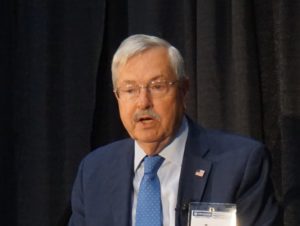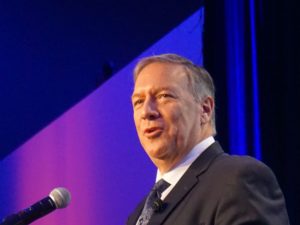
U.S.-China trade relations remain strong despite ongoing tensions between the two countries. Former U.S. ambassador to China Terry Branstad, former CIA Director and Secretary of State Mike Pompeo, and Jason Henderson, associate dean for Purdue University’s College of Agriculture, discussed the complicated relationship between the two countries during the Iowa Bankers Association’s Annual Convention Sept. 20-21.
Branstad, Iowa governor from 1983-99 and 2011-17, said his greatest achievement as ambassador was overseeing the first phase of a U.S.-China trade agreement that resulted in record Chinese purchases of U.S. corn, soybeans, pork, beef and chicken exports. As reported by the Cato Institute, China also took on new obligations for intellectual property protection, forced technology transfers and regulatory trade barriers for a variety of U.S. goods and services.
Although the U.S. seeks to contain China militarily, Henderson noted, many American goods are made within the country, requiring a balancing not needed during the Cold War between the United States and Russia. In 2019, U.S. goods imports from China accounted for more than 18 percent or $451.7 billion of overall U.S. imports, according to the Office of the U.S. Trade Representative. China is a prominent importer of U.S. ag products: In 2019, the U.S. exported $14 billion in ag products to China. Of that, $8 billion was in soybeans, $1.3 billion in pork and pork products, $706 million in cotton, $606 million in tree nuts and $412 million in hides and skins. During the Trump administration, the U.S. government focused on narrowing the trade gap with China. In 2019, the U.S. goods trade deficit with China was still $345 billion, a 17.6 percent decrease from 2018.
As reported by the Associated Press, tensions have also been heightened with the recent United States agreement to supply Australia with nuclear submarines and the launch of a European strategy for greater engagement in the Indo-Pacific. China has derided the moves, and the growing tensions between Beijing and Washington prompted U.N. Secretary-General Antonio Guterres to call on President Joe Biden and Chinese leader Xi Jinping to improve their poor relationship. The AP reported that Biden insisted the U.S. was not seeking “a new Cold War,” and Xi denied that China had or has any plans to “invade or bully others or seek hegemony.”

During the IBA conference, Pompeo advocated for a tough approach on China and said the Chinese Communist Party targets U.S. businesses and steals intellectual property rights. He accused the CCP of engaging in the largest coverup since the 1986 Chernobyl disaster in its examination of the origins of Covid-19 and derided the Biden administration for allowing “the Chinese Communist Party to castigate” the United States during a meeting in Alaska earlier this year. Though he said former Secretary of State Henry Kissinger was correct in opening up U.S.-China relations in the early 1970s during the Richard Nixon administration, he said America now faces too much exposure and risk in the relationship.
Branstad said the CCP values party loyalty above all else, controls education within the country and has a massive surveillance system. He described the revealing of Chinese spies in American universities during his ambassadorship, a revelation that further soured relations. As reported by Reuters, a Harvard University chair and two Chinese nationals who were researchers at Boston University and a Boston hospital were charged in January 2020 with lying about their alleged links to the Chinese government.
Branstad also discussed the CCP’s alleged ethnic cleansing of Uyghurs. Since 2014, the Chinese government has been accused of pursuing policies that incarcerated more than 1 million Muslims, the majority Uyghurs, in internment camps without any legal process.
